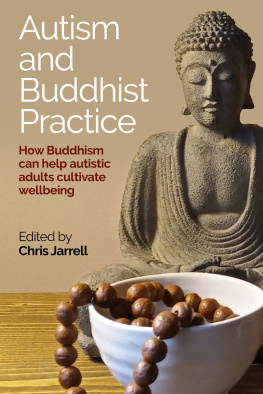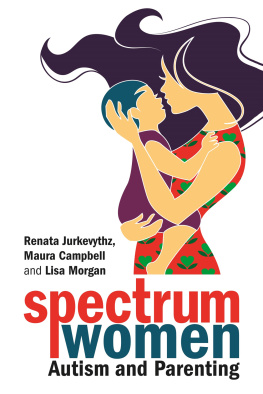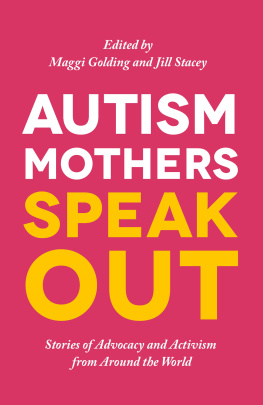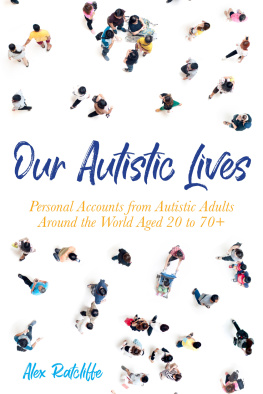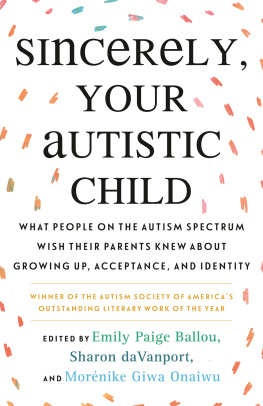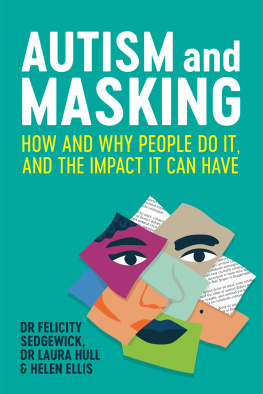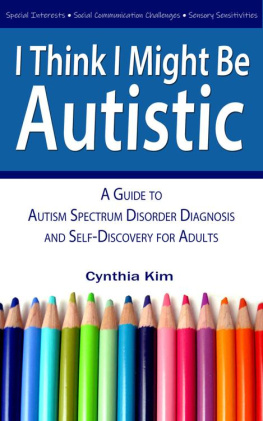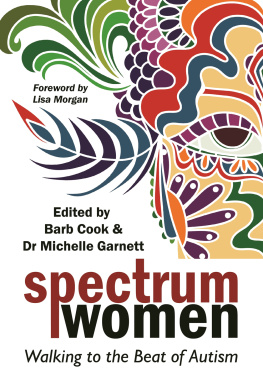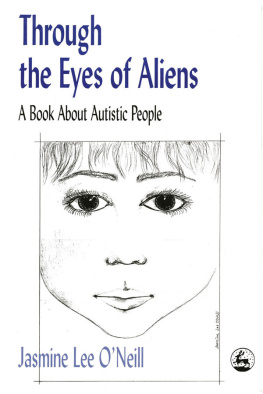Contents
Page list

of related interest
Aspergers Syndrome and Mindfulness
Taking Refuge in Buddha
Chris Mitchell
ISBN 978 1 84310 686 9
eISBN 978 1 84642 888 3
Mindful Living with Aspergers Syndrome
Everyday Mindfulness Practices to Help You Tune in to the Present Moment
Chris Mitchell
ISBN 978 1 84905 434 8
eISBN 978 0 85700 867 1
Autism and Spirituality
Psyche, Self and Spirit in People on the Autism Spectrum
Olga Bogdashina
ISBN 978 1 84905 285 6
eISBN 978 0 85700 591 5
Spirituality and the Autism Spectrum
Of Falling Sparrows
Abe Isanon
ISBN 978 1 84310 026 3
eISBN 978 0 85700 178 8
From Hurt to Hope
Stories of Mental Health, Mental Illness and Being Autistic
Edited by Mair Elliot
ISBN 978 1 78775 585 7
eISBN 978 1 78775 586 4
The Guide to Good Mental Health on the Autism Spectrum
Yenn Purkis, Emma Goodall and Jane Nugent
Forewords by Wenn Lawson and Kirsty Dempster-Rivett
ISBN 978 1 84905 670 0
eISBN 978 1 78450 195 2
Autism and
Buddhist Practice
How Buddhism Can Help Autistic
Adults Cultivate Wellbeing
E DITED BY CHRIS JARRELL

First published in Great Britain in 2023 by Jessica Kingsley Publishers
An imprint of Hodder & Stoughton Ltd
An Hachette UK Company
Copyright Jessica Kingsley Publishers 2023
Front cover image source: Chris Jarrell.
All rights reserved. No part of this publication may be reproduced, stored in a retrieval system, or transmitted, in any form or by any means without the prior written permission of the publisher, nor be otherwise circulated in any form of binding or cover other than that in which it is published and without a similar condition being imposed on the subsequent purchaser.
A CIP catalogue record for this title is available from the British Library and the Library of Congress
ISBN 978 1 83997 157 0
eISBN 978 1 83997 158 7
Jessica Kingsley Publishers policy is to use papers that are natural, renewable and recyclable products and made from wood grown in sustainable forests. The logging and manufacturing processes are expected to conform to the environmental regulations of the country of origin.
Jessica Kingsley Publishers
Carmelite House
50 Victoria Embankment
London EC4Y 0DZ
www.jkp.com
Negative thoughts can often cloud the minds of autistic individuals. This is due to the fact that life has been extremely challenging. Its important that when these thoughts occur you do not let them take over and pull you down. Finding ways to accept, channel, and manage this is very helpful.
Sarah Heath (2016, p155)
In essence, the Buddhas teaching on the Four Noble Truths leads us first to a profound recognition of the origins of suffering; then to the recognition of the origins of suffering; then to a recognition of the possibility of the cessation of suffering; and, finally, to a recognition of the path that leads to such freedom.
The Dalai Lama (2004, p13)
Contents
I would like to acknowledge the help of the following people in the compilation of this anthology. First of all, Lynda Cooper from Jessica Kingsley Publishers for spotting the potential of my book proposal and working with me and the contributors to bring the manuscript through to the production stage. The Rev. Sumi Loundon Kim at Yale for her invaluable practical advice and moral support in the planning and implementation of the project. Thanks also to Sister Linh Di and Mark Cooper for their valuable insights into the section What the Buddha Taught in this books introduction. The many Dharma teachers, Dharma centre directors and administrators, practice group coordinators and group leaders that forwarded my call for submissions through emails, newsletters, online posts and by word of mouth. All of the autistic people who contacted me to give me encouragement as well as to challenge my use of language and correct my understanding of the Dharma, and who also passed the call for submissions on to friends and colleagues. Thank you to Barry Taylor, for his input on Theravada Buddhism in What the Buddha Taught, and Sian Atkins, for her critical reading of the section Understanding Autism, also in the introduction. And, of course, all of the contributors to the anthology, both autistic and neurotypical, who gave their time and energy in working collaboratively with me. Thank you for trusting me with your stories.
And finally, the worlds of both Buddhism and autism can be both culturally and politically complex. I have attempted to take a middle way through this landscape while compiling this anthology. However, I acknowledge responsibility for any factual inaccuracies or biases you may come across despite my efforts. And I apologize in advance for any cultural insensitivities that you, either as an autistic person, a Buddhist practitioner or both, may be offended by whilst reading this book. I hope that this does not detract from you finding the book a useful insight into the lives of the autistic Buddhists that are illustrated herein.
I first came to Buddhism in the early 1990s when I attended an Order of Interbeing retreat in Scotland led by Sister Annabel Laity. It was then that I learned about mindfulness and its application to everyday life. I had always been an anxious personality, a loner and felt very different to other people. The silence of the retreat, the routine of each day and the lack of informal small talk suited me well. Mindfulness began to help me manage my anxiety, which was increasingly associated with social interactions and relationships, both at home and at work.
It was not until 30 years later that I was diagnosed with autism, at the age of 65, and I began to understand my life differently. In the interim I had deepened my understanding of the Buddhas teachings and associated practices such as meditation and mindfulness. The bringing together of this simple but profound philosophy on the nature of existence, and the logical and practical theory of mind, made sense to me. And now, it also sits well with my developing understanding of how autism has influenced me over the years, and still influences me today. My chosen spiritual path is helping me to integrate my understanding of autism into my life. It helps me to make sense of what often seems like a confusing and overwhelming social and emotional landscape. It also gives me practical ways of negotiating the stress and anxiety that is still a feature of my daily life, although less so now I am retired.
An increasing number of autistic people are finding Buddhist practices such as meditation and mindfulness helpful in improving mental health and wellbeing. This growing interest is reflected in books such as Mindful Living with Aspergers Syndrome by Chris Mitchell and The Autistic Buddha by Tom Clements both of whom are autistic. There are also various blogs and YouTube videos posted by autistic people who are actively embracing Buddhist teachings and practices, known as the Dharma. And it was when exploring these accounts online that the ideas behind this book began to arise.
Having been recently diagnosed as autistic, I wanted to meet other autistic people who had a similar approach to life as me. These books and online posts were, I suspected, just the tip of the iceberg. I was curious and decided to reach out to other autistic people who had taken refuge in the Buddha, the Dharma and the Sangha. I wanted to hear their stories what helped and hindered their progress on their chosen spiritual path.

